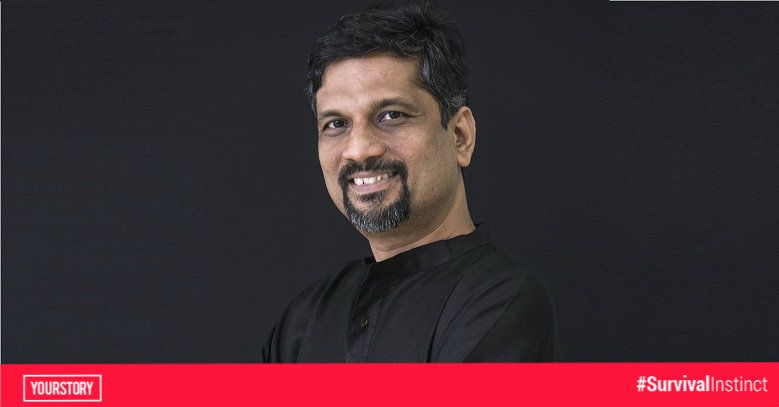'Work with people who believe in your idea' - Zoho Corp's Sridhar Vembu
For any startup that harbours long-term ambitions, surviving the first year of operations and coming out unscathed is the key. The first year brings with it self-doubts, human resource challenges, issues with co-founders if there are multiple partners, financial crunches, and market challenges. Tiding over these difficulties and surviving to tell the story by making it to the second year takes guts and perseverance, and only a few are blessed with it. YourStory is happy to present a new series of articles as part of the series Survival Instinct, that track how leading startups battled the demons and survived the first year of their operations. Today we bring to you Zoho Corp.
The co-founder of a $500 million SaaS business talks about his first year, and what pulled him through - it was winning clients fast.
Dance with the person that you want to dance with, and not the other way around – This has been Sridhar Vembu’s guiding principle when it comes to running Zoho Corp, and is the very same thing he tells everyone in the entire organisation.
Sridhar says that in his early days he and Tony Thomas, his batch mate from IIT-Madras, would discuss business and technology rather than attend parties. Sridhar says that in the early days, the two of them would complement each other in sales and technology. Tony would be the calming force behind Sridhar for all the stress of sales.
Zoho, which was started in 1996 as AdventNet, began with building applications for the telecommunications industry. On the challenges he overcame in the first year, Sridhar is candid. “I got lucky. I had four siblings, who came and worked for me and my wife supported me in the early days and she was a home maker,” he jokes.
He recounts a pitch meeting with a large potential corporate customer in Las Vegas. He and Co-founder Tony Thomas had a few thousand dollars in their pockets, and were on a tight budget. They stayed in a cheap hotel and just focused on winning the client on the next day. At the meeting, the duo took on the daunting task of marketing their proprietary software that would would manage the patches on the networking company, and how it could handle their networks and make their assets never face a down time.
Their original thinking won the company a multi-year contract, and even to this day, Zoho gets royalties from some of its earlier programmes sitting in network centres.

The deal led to Sridhar turning a strong believer in the frugal approach and betting on the people, encouraging them to build products that are world class and would make organisations find Zoho, rather than focusing on a sales-driven approach. The frugal approach meant not spending on the lavish things in life, but on the essentials. Sridhar’s principle was not to work long hours on end, but to work smart and create efficient software.
That's where Sridhar’s “dancing” analogy comes from.
As the co-founder of the $500 million Zoho Corp, Sridhar is one of those entrepreneurs that did not have to go to the market, or the Venture Capital community, to raise funds. He practically did it all by himself, with a little help from friends and family.
When he set up the company with Tony, he did not look at a one-year timeline, but focused on a concept where he would ask where the company would be in five years. “You almost think like your business is on minus five, which means you have to look ahead and do the things necessary to survive that long. Startups should realise that they should generate cash from Day One, by consulting or building software for others, and plough back that cash to focus on their original product,” says Sridhar.
Sridhar does not watch TV, and read his way to studying the economy of each country and swears by the Economist. In fact, he knows the GDP and per capita income of several countries by heart. “This was all that I focused on apart from building technology and giving value to clients,” he says.
Here are some tips from Sridhar:
- My father and mother never went to college, I had to work harder to get to IIT-Madras. They inspired me and I carried those humble beginnings forward in my startup journey. I just wanted to be a better person.
- I came from a Tamil medium school, but you use your roots to open up and constantly learn, which is what I did in my first year.
- After my short stint at Qualcomm I started my company, in the early days I learned to conserve cash because I was investing everything in the idea. I invest in ideas and use cash to build great software. In the first year, and even later on, I did not attend any parties or did not watch TV. I had to make it and focused on winning.
- I ensured that software paid my bills from day one, the client had to go live with product soon and I ensured that we were generating cash.
- People ask me about my business struggles, but work and family was everything to me and this made me remain focused on scaling up. Perhaps Tony was the person who calmed me a lot in that first year.
Sridhar tells startup founders that when they build products, they need to know what they are signing in to. He advises the following based on his experiences in his first year:
- Lead a good family life, you need not work long hours to make good software products.
- Not all products become successes:
- Not every sale materialises: Sridhar says that he met several companies that would turn him down, but he says that it is only a matter of time before they sign up with you if your product is adopted in the market.
- Business ideas may never scale, it is in the execution that one gets to know where the idea stands.
- Work with employees who believe in the idea.
- Not all business can generate cash, and going to VCs is also a good thing although Sridhar says he never had to.
- Conserve cash, use it to build future products that will generate more cash.
Sridhar believes in frugality, and believes his early days were a success thanks to the quick contracts he was able to win in the telecom industry.
“The founders must be able to sell their ideas, it is their business. Others cannot do it for you. It is about what the technology can do for the clients, and not about the technology at all,” he says.
The other thing is continuous learning, Sridhar says he was an electrical engineer who worked in the chip company Qualcomm in San Diego, building wireless communication modules. He says engineers are supposed to find solutions, and that any logical mind, upon learning, can find quick solutions to business problems.
One of Sridhar’s first wins was a Bay Area-based networking giant. “Founders must realise it's not the big wins that matter. You have to constantly be out there in the market and proving that the product works,” he says.
He says that in the early days, Tony helped in building the tech and managing the team. In conclusion, Sridhar says there is no formula for survival. It's just business, and you have to innovate and show value to clients.











